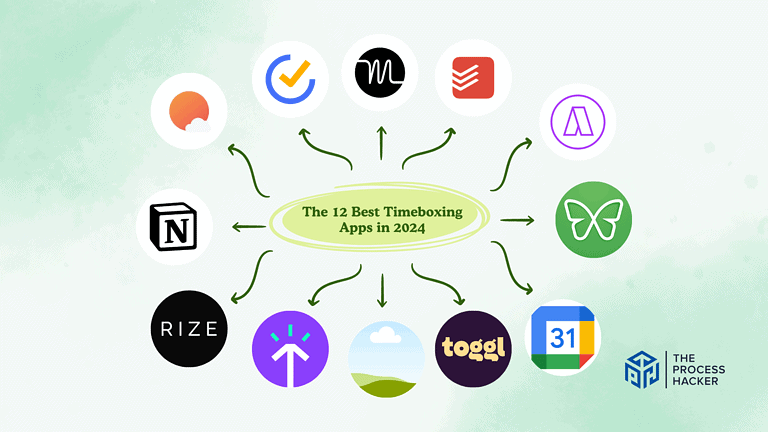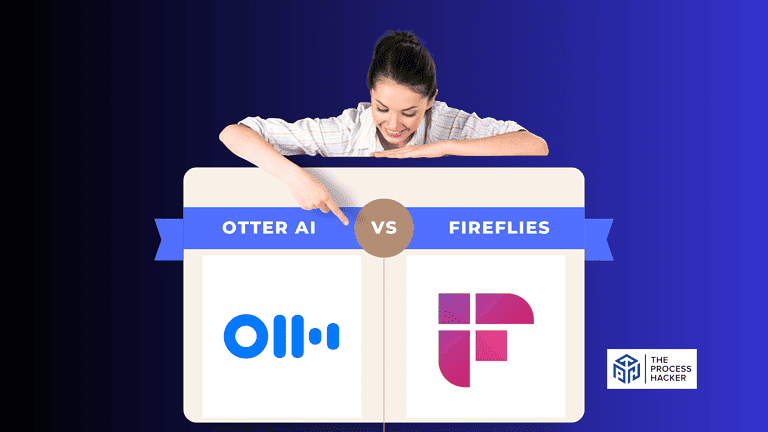Growth Mindset vs Fixed Mindset: Which Mindset Should You Have?
Are you stuck in a rut and feeling like nothing you do is enough?
If so, it might be time to explore the power of shifting from a fixed mindset to a growth mindset! Discover how this shift can open up new paths of possibility, helping you reach your greatest ambitions and potential.
Whether it’s work-related, personal, or relationship goals – with a growth mindset, we can all have more rewarding lives.
Learn to challenge yourself and accept failure rather than fear it. Find out why having an environment of learning is key for success; stay ahead through constant improvement – rediscovering that your best performance is just around the corner!
Read this growth mindset vs fixed mindset guide, and take the first step towards transforming yourself today!
Introduction to Growth and Fixed Mindsets
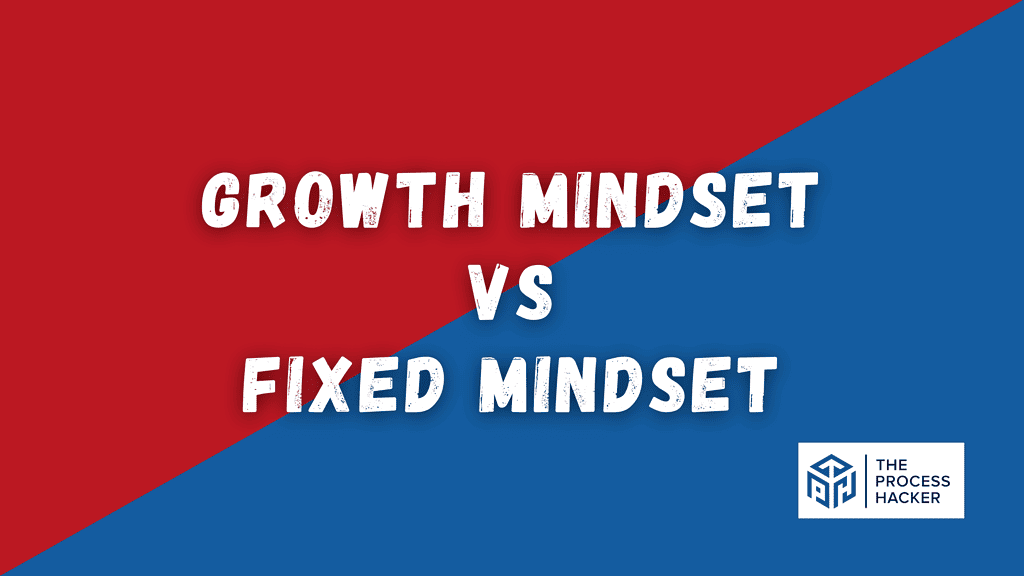
Growth mindset vs fixed mindset? Embracing the right mindset can be a game-changer in your sales process.
Let me guide you through the significance of the two mindsets of growth and fixed mindsets, which can dramatically shape your approach to CRM automation.
What Is A Fixed Mindset?
A fixed mindset means believing that your abilities and intelligence are set in stone – that they’re innate and unchangeable. Some people think having this mindset is the right way if they already have a stable career or life.
Evidently, one study found that elementary and high school students were more adaptable than middle school students in changing their perspectives as they thought they already had everything they needed. If you’re one of the fixed mindset people, you might avoid challenges or give up easily, believing you don’t possess the natural talent for certain tasks or skills.
Having a fixed mindset can limit your potential for growth and the learning process.
What Is A Growth Mindset?
A growth mindset views intelligence as being developed over time. It’s the conviction that you can enhance your skills and knowledge with effort, learning, and persistence.
If you have a growth mindset, you view challenges as opportunities for growth and learning rather than obstacles. It’s all about believing in your potential to evolve and improve.
Origins and Development of the Fixed and Growth Mindset
Let’s take a journey back in time and understand where growth and fixed mindsets come from and how they’ve developed over the years.
Historical Background
The concepts of a fixed and growth mindset didn’t just emerge out of nowhere. They have been studied in social psychology for decades, but psychologist Carol Dweck popularized these terms in her research.
She observed that while some successful people wilt in the face of setbacks, others flourish, and she attributed this huge difference to their underlying beliefs about learning and intelligence.
Psychology
In developmental psychology, a fixed and a growth mindset represent two different ways individuals think about their abilities and potential.
Those with a fixed mindset believe they have natural talents as innate gifts, while those with a growth mindset believe they can develop their abilities through dedication and hard work. These fixed and growth mindsets play a crucial role in our behavior, our relationship with success and failure, and, ultimately, our capacity to grow personally and professionally.
Characteristics of Fixed Mindset
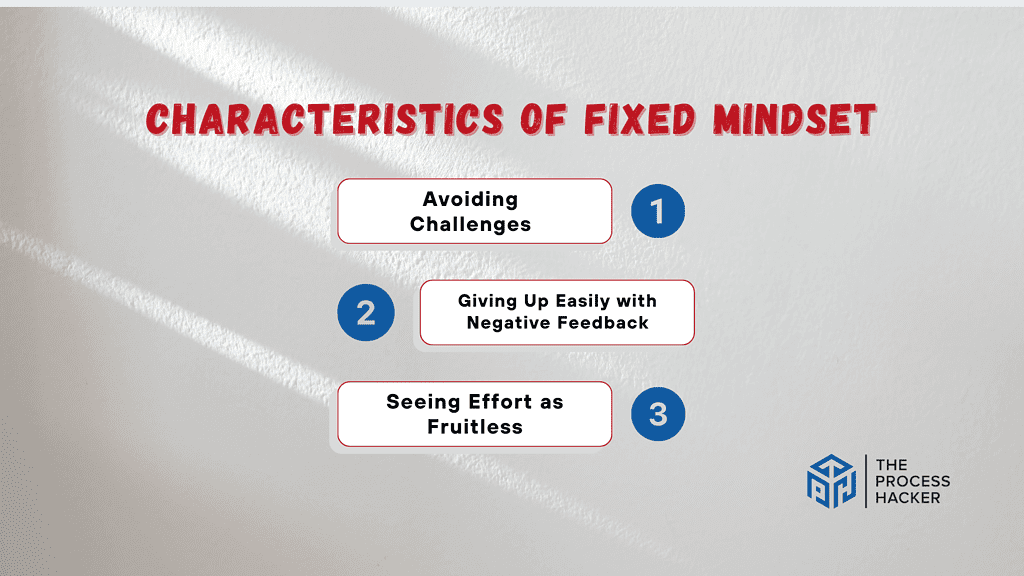
So, what are the characteristics of fixed traits? Understanding these traits is crucial for you to identify and shift away from this limiting perspective.
#1) Avoiding Challenges
Those with a fixed mindset avoid challenges. If you believe your abilities are set in stone, a challenge becomes a risk you might not want to take. Why? Because it could expose your limitations and result in failure.
An example of avoiding challenges due to a fixed mindset can be seen in the professional setting. Let’s say you’re a project manager who has always excelled at managing small teams and short-term projects. One day, your boss offers you an opportunity to lead a much larger team on a long-term, high-stakes project.
You might immediately shy away from this opportunity if you have this mindset. You might think, “I’m good at managing small projects. This larger one could reveal that I can’t handle big tasks.”
Instead of viewing the situation as a chance to grow and expand your skills, you see it as a threat to your current status and reputation. So, you decline the offer and stick to what you know you’re good at.
This avoidance keeps you in your comfort zone and prevents you from developing new skills and reaching your full potential. It’s a protective strategy that ultimately limits your growth and opportunities for success.
#2) Giving Up Easily with Negative Feedback
Suppose you are a marketing executive who has recently proposed a new digital marketing strategy for your company. You’ve put significant effort into this proposal, so you look forward to presenting it to your team and hearing their thoughts.
During your presentation, your colleagues offer some critical feedback. They point out potential flaws in your strategy, question your data analysis, and suggest that the approach might not yield the expected results.
If you have a fixed mindset, you might perceive this feedback as a direct attack on your capabilities as a marketing executive.
Instead, you can choose to see it as an opportunity to refine your strategy and strengthen your proposal, you interpret the feedback as evidence of your inadequacy. This could lead you to become defensive or discouraged, and you might even decide to abandon the proposal altogether because you feel you simply aren’t good enough.
This reaction is rooted in the belief that your skills and abilities are fixed, and any criticism is seen as a permanent reflection of your competence.
#3) Seeing Effort as Fruitless
Another common fixed mindset trait is viewing effort as pointless or even negative. If you believe talent is born, not made, then the new ideas of putting in effort to improve can seem futile. You might think, “Why bother trying if I’m not naturally good at this?”
Imagine you’re a project manager, and your team has been assigned a complex project that requires new skills and techniques that your team isn’t familiar with.
If you have a fixed mindset, you might believe that either you and your team have the natural ability to handle this project or you don’t. The new idea of investing time and effort into learning these new skills might seem pointless to you.
You might think, “Why should we invest so much time and energy into learning something we’re not naturally good at? We should focus on projects that align with our existing skills.”
This perspective sees the effort as fruitless when acquiring new skills or knowledge. It operates under the assumption that intelligence and ability are innate and static rather than something that can be developed with effort and persistence.
Characteristics of Growth Mindset
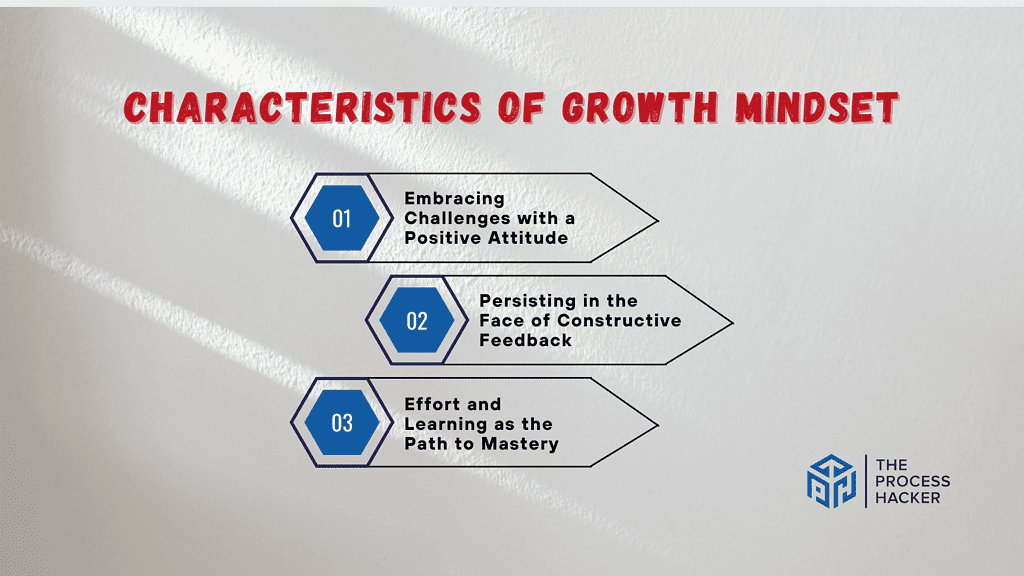
Now, let’s flip the coin and look at the characteristics of a growth mindset. Understanding these traits can help you cultivate this empowering perspective.
#1) Embracing Challenges with a Positive Attitude
Having a growth mindset means you typically see challenges as exciting opportunities for learning and development. One of the growth mindset examples is you understand that stepping outside your comfort zone is key to growth, so you approach difficulties with a positive, can-do attitude.
With a growth mindset, difficulties aren’t roadblocks but mountain trails. You see them as exciting paths to conquer, each obstacle a chance to hone your skills and strengthen your resolve.
Remember that time you aced that presentation after countless shaky rehearsals? Or mastered that complex recipe after several (hilariously edible) mishaps? That’s the magic of a growth mindset in action. You embrace the climb, knowing every wobble makes you a sturdier climber.
The words “I can’t” become “not yet” in your vocabulary. Challenges don’t trigger instant discouragement. Instead, they spark curiosity. You’re not fixated on proving your innate talent but on expanding your potential.
Every mistake is a lesson, every setback a detour with a hidden shortcut. The focus shifts from being “naturally gifted” to becoming continuously better.
Adopting a growth mindset isn’t a one-time switch; it’s a continuous journey. There will be moments of doubt, whispers of the fixed mindset, trying to regain control.
But with every challenge you tackle, every skill you master, that voice gets quieter, replaced by the resounding chant of your growth mindset. So, embrace the climb, and let the thrill of learning fuel your every step!
#2) Persisting in the Face of Constructive Feedback
One of the hallmarks of a growth mindset is resilience when receiving negative feedback. Instead of feeling discouraged by criticism, you see it as an opportunity for improvement. You embrace constructive feedback, using it to hone your skills and expand your knowledge.
If you’re learning a new language, you may struggle with pronunciation. Instead of feeling defeated when someone corrects your speech, you appreciate their input. You recognize that their feedback is a chance to improve. You take note of the corrections, practice diligently, and gradually, your pronunciation improves. This approach enhances your language skills and builds resilience and adaptability, valuable traits in many areas of life.
Moreover, a growth mindset involves seeing challenges as opportunities to grow rather than insurmountable obstacles. When faced with a difficult problem, instead of thinking, “I can’t do this,” you think, “I can’t do this yet.” This small shift in perspective can profoundly impact how you approach learning and development.
A growth mindset is about embracing challenges, persisting in the face of setbacks, seeing effort as the path to mastery, learning from criticism, and finding lessons and inspiration in the success of others. By adopting this mindset, you set yourself on a path of continuous learning and improvement, which can lead to greater success and fulfillment.
#3) Effort and Learning as the Path to Mastery
With a growth mindset, effort isn’t seen as a chore or a sign of inadequacy but as a necessary step toward mastery. You believe consistent effort and continuous learning are the keys to enhancing your abilities and reaching your full potential.
Imagine you’re a budding entrepreneur launching a start-up. Initially, you may face numerous challenges: understanding market needs, managing finances, or even building a customer base. Instead of viewing these challenges as signs of failure or limitations, you see them as opportunities for growth and learning.
You invest time in understanding market trends, seek advice from more experienced business leaders, and learn from each setback. Every effort you make, from refining your business model to enhancing your marketing strategies, is seen as a step towards mastery in the business world.
This approach is transformative. It allows you to navigate the ups and downs of entrepreneurship with resilience. Instead of being discouraged by failures or setbacks, you use them as a catalyst for growth.
You understand that each effort and challenge you overcome contributes to your overall business acumen and success.
Adopting a growth mindset in your career or business means recognizing that success is not just about innate talent or luck; it’s also about perseverance, learning from experiences, and continuously striving to improve.
This mindset drives personal development and paves the way for long-term success and fulfillment in your professional life.
Why Should You Develop A Growth Mindset?
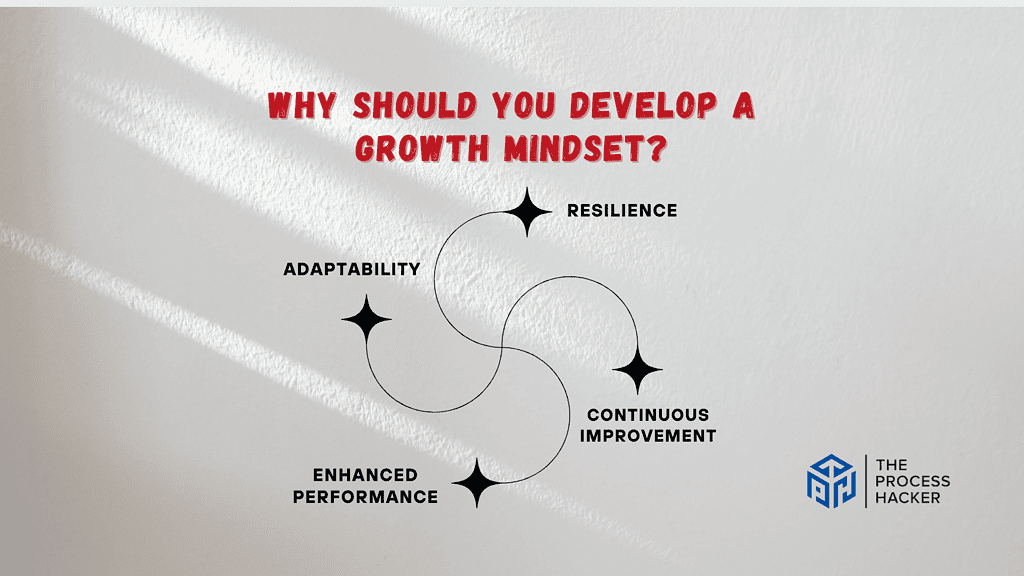
Imagine unlocking a version of yourself that sees endless possibilities and embraces every challenge as a chance to grow. That’s the power of a growth mindset.
In today’s rapidly changing world, adapting and learning continuously isn’t just an advantage; it’s a necessity. Developing a growth mindset is the key to thriving personally and professionally. Here’s the list of the reasons why you should develop a growth mindset:
- Adaptability
- Resilience
- Continuous improvement
- Enhanced performance
#1) Adaptability
In a world that’s changing at a rapid pace, adaptability is more important than ever. With a growth mindset, you’re not just prepared to adapt; you’re excited by the prospect of it. You see change as an opportunity to learn and grow, not a threat to your comfort zone.
This makes you more flexible and resilient when facing new challenges and unfamiliar situations. So, if you want to thrive in today’s dynamic world, cultivating a growth mindset can be your key to becoming more adaptable.
#2) Resilience
Resilience is about bouncing back from setbacks and failures, and a growth mindset is the fuel that drives this resilience. When you adopt a growth mindset, you see failures not as a reflection of your abilities but as valuable learning experiences that can help you improve.
This perspective lets you maintain your motivation and keep pushing forward, even when things get tough. So, if you want to build resilience and navigate through life’s challenges with a more positive outlook, developing a growth mindset should be your next step.
#3) Continuous Improvement
In the journey of life, standing still is not an option. With a growth mindset, you’re always on the move, always striving for better. You view every day as an opportunity to learn something new, to improve yourself, and to take one step closer to your goals.
This constant pursuit of improvement can lead to significant progress over time, whether in your personal life, career, or any other area you’re passionate about. Adopting a growth mindset could be your ticket to continuous improvement if you never want to stop growing.
#4) Enhanced Performance
Performance is not just about natural talent; it’s also about the mindset you bring to your tasks. With a growth mindset, you believe your abilities can be developed through dedication and hard work.
This belief can inspire you to put in extra effort, push your limits, and ultimately enhance your performance. Whether at work, school, or hobbies, a growth mindset can help you perform at your best and achieve your full potential. If you’re aiming for peak performance, developing a growth mindset should be part of your strategy.
But how do you cultivate this growth mindset? That’s where the following method comes into play. Built on years of research and practical experience, this approach provides the tools and new strategies to shift from a fixed mindset to a growth mindset.
This method is about changing your thoughts and transforming how you live, learn, and grow. So, are you ready to embrace these new ideas to change and unlock your potential?
How To Shift From A Fixed To A Growth Mindset
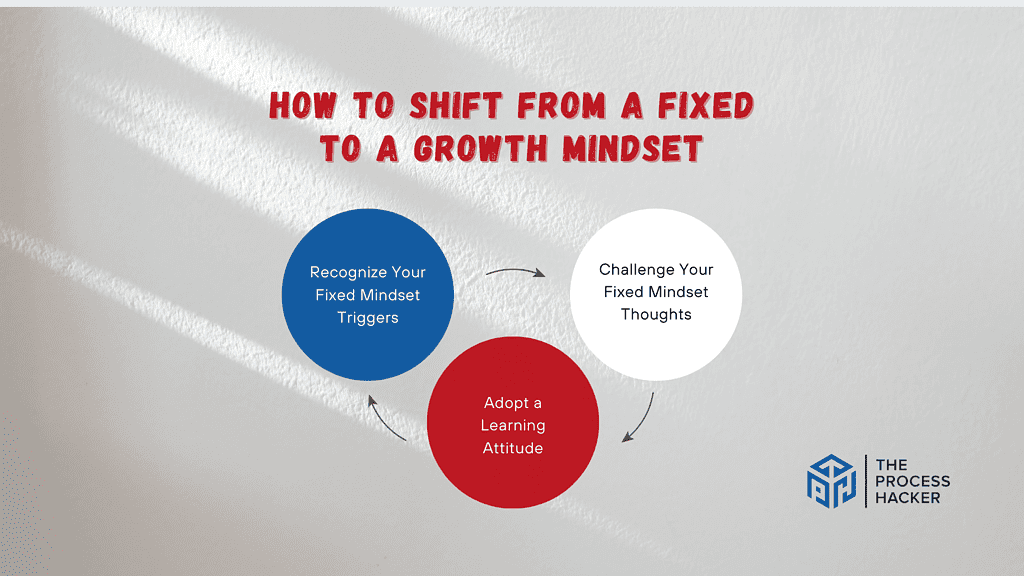
Shifting from a fixed mindset to a growth mindset isn’t just about changing how you think; it’s transforming how you live, learn, and approach challenges.
This unique process guides you through this transformation in a structured yet personalized way. It’s about rewiring your thought patterns to embrace growth, learning, and resilience.
Before we jump into the step-by-step guide, let’s set the stage for your mindset shift. Remember, this process requires patience and commitment.
Sometimes, you stumble or fall back into old patterns, but don’t lose heart. Each step forward, no matter how small, brings you closer to a growth mindset.
#1) Recognize Your Fixed Mindset Triggers
The first step is to know when and why your fixed mindset surfaces. Is it when you face a new challenge? When do you receive criticism?
Start by identifying these moments and acknowledging them. This awareness is crucial because you can’t change what you don’t recognize.
#2) Challenge Your Fixed Mindset Thoughts
Once you’ve identified your triggers, the next step is to challenge the fixed mindset thoughts that arise. For example, if you think, “I can’t do this,” pause and reframe it to “I can’t do this yet, but I can learn.”
It’s about shifting your internal dialogue from a place of limitation to a place of potential and growth.
#3) Adopt a Learning Attitude
Finally, start embracing this learning opportunity and effort as key components of growth. Instead of focusing solely on the outcome, value the process of learning and the effort you put in.
Celebrate small victories and learn from setbacks. Understand that effort is a path to mastery and growth, not just a means to an end.
Key Considerations For Adopting A Growth Mindset
While the steps outlined above provide a solid foundation for shifting towards a growth mindset, a few additional considerations can enhance your journey.
Firstly, it’s important to remember that adopting a growth mindset is not about denying your weaknesses or pretending they don’t exist. It’s about acknowledging these areas and viewing them as opportunities for improvement rather than insurmountable obstacles. Embrace your imperfections, as they are the gateways to your personal development journey.
Secondly, cultivating a growth mindset doesn’t mean you will win every time. You will still encounter failures and setbacks. However, the key differences lie in how you interpret these experiences. Instead of seeing them as proof of your inability, view them as valuable feedback, providing crucial information on areas where you can focus your efforts to improve.
Lastly, remember to be patient with yourself. Shifting a mindset isn’t an overnight process. It requires time, effort, and a lot of self-compassion. Don’t get discouraged if progress seems slow.
Celebrate each small victory and keep reminding yourself of why you embarked on this journey in the first place.
Taking it to the Next Level: Read Mindset by Carol Dweck
To truly deepen your understanding and commitment to a growth mindset, I highly recommend reading “Mindset: The New Psychology of Success” by Carol Dweck, a psychologist from Stanford University.
This book isn’t just a resource; it’s a roadmap that can guide you to new levels of personal and professional achievement. Dweck’s insights are groundbreaking and incredibly practical, providing the tools to transform your approach to challenges, setbacks, and successes.
Dweck’s research goes beyond the basics, offering a nuanced understanding of how a growth mindset can be applied in different areas of your life, from education and sports to business and relationships. By exploring these diverse scenarios, you can learn how to apply a growth mindset in contexts specific to your life and goals.
The book is filled with real-life examples that will resonate with you, showing how a shift in your own mindset can lead to profound changes in all aspects of your own life.
Moreover, “Mindset” provides strategies for identifying and overcoming the limitations of fixed thinking. This deeper dive can help you break through barriers you may not have realized were holding you back.
As you read and absorb the wisdom in this book, remember that the journey towards a growth mindset is ongoing. It is a perspective worth maintaining throughout your life’s journey.
Final Thoughts on Fixed and Growth Mindsets
As we wrap up our exploration of how growth mindset vs fixed mindset plays, I want you to reflect on the powerful journey you’ve embarked on.
Remember, shifting from a fixed to a growth mindset isn’t just about changing your thinking; it’s about transforming your approach to life’s challenges and opportunities. This shift empowers you to embrace learning, face setbacks with resilience, and pursue continuous self-improvement.
Why should you listen to me? I’ve walked this path myself and witnessed the transformative impact of adopting a growth mindset. It’s not just theory; it’s a lived experience.
The insights I’ve shared with you are not only grounded in research but also in real-life applications. My goal is to guide you through this journey, offering practical advice and encouragement every step of the way.
Remember, the transition to a growth mindset is a journey, not a destination. It requires patience, persistence, and a willingness to embrace challenges.
Keep these lessons close to your heart, and you’ll grow in ways you never imagined. Here’s to your journey towards a more fulfilling and growth-oriented life!






